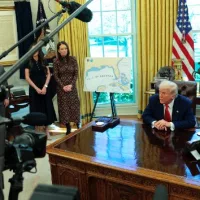
(WASHINGTON) — Lawyers for Meta told a federal judge on Monday that the social media company founded by billionaire Mark Zuckerberg is not a monopoly, countering a landmark lawsuit brought against it by the Federal Trade Commission accusing the tech giant of gobbling up its competitors to corner the market.
“Meta has no Monopoly,” Mark Hansen, an attorney for the company argued in U.S. District Court in Washington, D.C., as the trial got underway.
The case marks the first significant opportunity for President Donald Trump’s administration to follow through on the president’s campaign promise to take on Big Tech.
In court filings, the FTC argued that Meta purposefully and illegally undercut smaller rivals to “neutralize perceived competitive threats.”
The FTC lawsuit, originally filed in 2020 when Meta went by Facebook, alleges that the company bought Instagram and WhatsApp to establish an illegal monopoly.
“Unable to maintain its monopoly by fairly competing, the company’s executives addressed the existential threat by buying up new innovators that were succeeding where Facebook failed,” the FTC’s attorneys wrote in the court documents.
FTC lawyers called Zuckerberg as their first witness on Monday. Zuckerberg faced questions about his company’s inner workings and how it has evolved in recent years to respond to competition from other social media platforms.
If Meta loses, the lawsuit could force a dismantling of the company by forcing it to break off the two apps, Instagram and WhatsApp, it purchased over a decade ago.
Meta’s legal team argued in court that the case centers on broader “industry issues” — not just issues concerning Meta. They claimed that many of Meta’s innovations and acquisitions were in response to moves by “peer” tech companies.
During Monday’s court proceedings, Meta’s lawyers said the company has been “pro-competitive,” arguing the government “doesn’t want to talk about” TikTok, a rival that they contend “rocked the world,” and sent Meta into “a crisis.”
In opening statements, Meta’s lawyers claimed that “consumer welfare” is not the central issue in the case.
The company said it had to adapt after TikTok’s explosive growth during the pandemic.
“Meta didn’t even have a short-form video feature” when TikTok was launched in 2016 by the Chinese technology company ByteDance, Meta’s lawyers argued.
Meta’s legal team added that many creators were initially skeptical of Instagram Reels, a product launched in response to TikTok, because short-form videos tended to monetize significantly less than longer traditional videos.
The social media company’s lawyers pointed to other platforms adapting short-form videos like YouTube shorts, Snapchat, X (formerly known as Twitter) and LinkedIn as examples of similar responses to TikTok’s success. Meta, they said, had to “move with the times or end up like MySpace,” the now-defunct social media site that dominated the industry two decades ago.
Meta’s lawyers also cited a 2021 Meta outage, during which users turned to other platforms. TikTok saw an 11% increase in users and YouTube gained 8%, Meta’s lawyers argued, presenting the figures as proof that competitors have substantial influence. They added that Meta accounts for less than 20% of total time spent on social media platforms.
Much of Zuckerberg’s early testimony Monday focused on the Facebook News Feed and how users interact with friends, something he said has shifted as people moved from desktop computers to mobile devices.
He acknowledged that the emphasis on friendship had declined as users began to share content differently. He noted that by 2018, there was growing discourse over whether time spent on social media was beneficial.
“The friend part has gone down quite a bit, it’s still something we care about,” Zuckerberg testified. However, he added that friendship is now “one part of what we do.”
Later Monday, the FTC lawyers questioned Zuckerberg about his company’s acquisition of Instagram. The deal occurred after Facebook’s own camera app, Snap, failed to compete, the government’s lawyers noted.
In emails from February 2012 read in court by the FTC lawyers, Zuckerburg wrote, “Snap might be a good first step but we’d be very behind in both functionality and brand core use cases of Facebook will develop in the mobile world, which is really scary and we might want to consider paying a lot of money for this.”
When questioned about the 2012 Instagram purchase, Zuckerberg said his company had just gone public and had the capital. He characterized the email as an example of his desire to do a build-versus-buy analysis.
When asked about his “scary” remark, Zuckerberg testified that he “read this as trying to analyze, I think, where the value is with Instagram.”
“Some of the stuff is simply hypothetical, that this could potentially be scary. I’m not sure if I read this as I was really scared at the time,” Zuckerberg said.
Zuckerberg said that when he wrote the email, he was thinking about whether it was the best approach to buy Instagram.
“By this point, I was leaning toward we should buy them if we could,” he testified.
Shortly after the conversation in February 2012, Meta bought Instagram in April for $1 billion.
In a statement released on Monday, Meta said, “The evidence at trial will show what every 17-year-old in the world knows: Instagram, Facebook and WhatsApp compete with Chinese-owned TikTok, YouTube, X, iMessage and many others.”
The company added, “More than 10 years after the FTC reviewed and cleared our acquisitions, the Commission’s action in this case sends the message that no deal is ever truly final. Regulators should be supporting American innovation, rather than seeking to break up a great American company and further advantaging China on critical issues like AI.”
Zuckerberg is expected to return to the witness stand on Tuesday.
Copyright © 2025, ABC Audio. All rights reserved.














